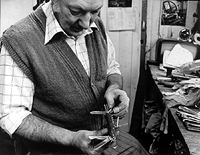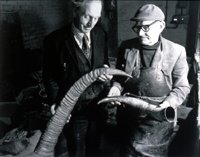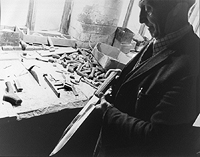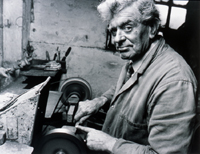Boats
Building
Cutlery
Fabric work
Furniture making
Glasswork
Leather work
Metal work
Stone work
Woodwork
Miscellaneous
Knife blade grinder
Penknife Cutler
Horn cutters
The 'little mesters' who still exist in Sheffield with
surprising resilience, despite the formidable difficulties facing the
cutlery trade because of fierce foriegn competition, are the successors
of workers in Nineteenth century independent cottage industries.
 |
Close-up of a fully equipped penknife
with each of the tools being hand made by Eric Wragg before the
knife is assembled. |
The horn trade grew alongside the cutlery trade in suplying
it with material for knife handles and 'scales' or coverings for pen
and pocket knives. English oxen and cattle would have provided Sheffield
craftsmen with horn even in Chaucer's day.
 |
Bernard Whiting and Harry Scarlett, formerly of Rocking
Street, Sheffield were the last of the industry's horn cutters in
the city. Their raw materials would include two types of buffalo
horn. |
 |
Harry Scarlett holds a knife fitted with a deer horn
handle |
